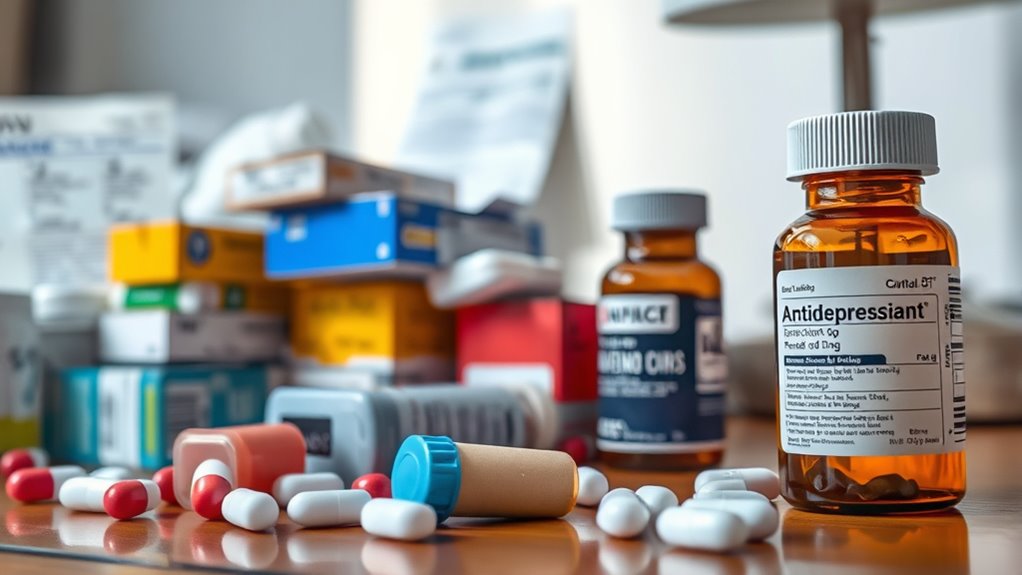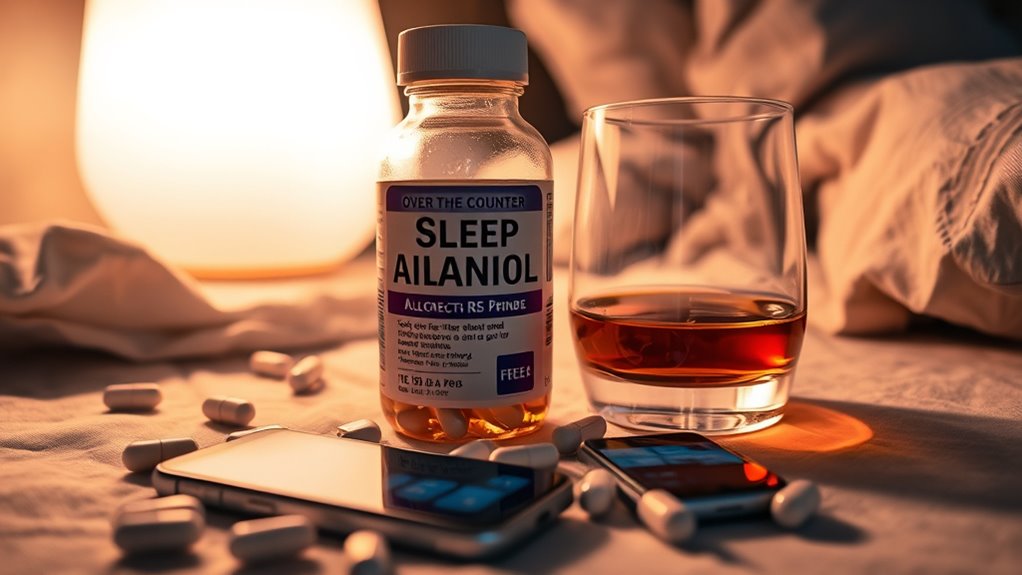When taking over-the-counter medications, you should watch for interactions with blood thinners, antidepressants, herbal supplements, alcohol, and minerals. Combining pain relievers with blood thinners can increase bleeding risks, while cold medicines may cause serotonin syndrome or raise blood pressure if mixed with antidepressants. Herbal supplements like St. John’s Wort or ginseng can alter drug effects. Don’t forget that alcohol can strengthen sleep aid sedatives, and antacids can prevent mineral absorption. Stay informed to stay safe—more essential tips lie ahead.
Key Takeaways
- Avoid combining blood thinners with NSAIDs or herbal supplements like ginkgo, which can increase bleeding risk.
- Be cautious when mixing cold medications with antidepressants to prevent serotonin syndrome and blood pressure issues.
- Space out antacids with iron or calcium supplements by at least two hours to ensure proper absorption.
- Use sleep aids cautiously with alcohol, as combined sedative effects can impair coordination and respiration.
- Always disclose herbal supplement use to healthcare providers to prevent unpredictable drug interactions.
Mixing Pain Relievers and Blood Thinners

Mixing pain relievers and blood thinners can be risky because both types of medications affect your blood’s ability to clot. If you’re using herbal remedies like ginkgo or garlic supplements, they can amplify bleeding risks when combined with blood thinners. It is crucial to adhere to dietary restrictions, such as limiting foods rich in vitamin K if you’re on specific blood-thinning medications, as these can interfere with medication effectiveness. Many over-the-counter pain relievers, like NSAIDs, increase bleeding tendencies and should be avoided unless your healthcare provider approves. Always inform your doctor about any herbal remedies or dietary habits that could impact your blood’s clotting ability. Doing so helps prevent dangerous interactions and ensures your safety.
Combining Cold Medications and Antidepressants

Combining cold medications and antidepressants can lead to serious interactions that affect your mental health and physical well-being. You might experience:
- An increased risk of serotonin syndrome, causing confusion, rapid heart rate, or tremors.
- Reduced medication efficacy, making your antidepressants less effective at managing depression.
- Elevated blood pressure if you take certain decongestants with antidepressants.
- Greater side effects like dizziness or insomnia due to overlapping ingredients.
Always check labels and consult your healthcare provider before combining these medicines. Cold medications containing dextromethorphan or pseudoephedrine can interact dangerously with antidepressants, heightening risks of serotonin syndrome. Being aware helps you avoid unexpected health issues and ensures your medications work as intended.
Using Herbal Supplements With Prescription Drugs

Herbal supplements are often viewed as natural and safe, but they can interact with prescription drugs in ways that may compromise your health. Herbal interactions can alter how your medications work, either enhancing or reducing their effectiveness. For example, St. John’s Wort can decrease the absorption of certain drugs, making them less effective, while ginseng might increase bleeding risk when combined with blood thinners. It’s essential to understand that supplement effects aren’t always predictable, especially when mixed with prescription medications. Always inform your healthcare provider about any herbal supplements you’re taking. This helps prevent harmful interactions and ensures your treatment plan remains safe and effective. Recognizing trust issues with supplements and medications can prevent adverse outcomes. Never assume that “natural” means harmless—your health depends on careful management of herbal interactions.
Over-the-Counter Sleep Aids and Alcohol

Have you ever wondered what happens when over-the-counter sleep aids and alcohol are used together? Mixing these can be risky because alcohol amplifies the sedative effects of sleep aids. For example:
- Your drowsiness increases, making you more prone to accidents.
- Melatonin interactions can disrupt your natural sleep cycle.
- Antihistamine effects intensify, leading to dizziness and confusion.
- Combining alcohol with sleep aids can impair your respiratory function.
- Using these substances together can negatively impact your environmental considerations, such as increasing the risk of accidents and injury.
These interactions heighten side effects and reduce sleep quality. Alcohol can also interfere with how your body metabolizes melatonin supplements and antihistamine-based sleep aids, making them less effective or more dangerous. Always check labels and consult a healthcare professional before combining alcohol with over-the-counter sleep aids.
Antacids and Iron or Calcium Supplements

Taking antacids along with iron or calcium supplements can diminish the effectiveness of both. This occurs because of digestive interference, which causes absorption issues. When taken together, antacids can bind to minerals like iron and calcium, preventing your body from absorbing them properly. To avoid this, take these supplements at different times—preferably, wait at least two hours after or before taking antacids. Here’s a quick reference:
| Supplement Type | Timing Advice | Effect of Overlap |
|---|---|---|
| Iron | Take 2 hours apart | Reduced absorption, less effectiveness |
| Calcium | Take 2 hours apart | Digestive interference, absorption issues |
| Antacids | Avoid simultaneous use | Impairs mineral absorption |
| Best Practice | Space doses by 2 hours | Ensures ideal absorption |
This approach helps prevent digestive interference and absorption issues, and being aware of cookie consent policies can help you manage online health resources effectively.
Frequently Asked Questions
Can OTC Drugs Affect the Effectiveness of Prescription Medications?
Yes, OTC drugs can influence the effectiveness of your prescription medications. For example, herbal supplements might interact and reduce or enhance drug effects, while alcohol interactions can increase side effects or diminish medication efficacy. Always read labels carefully, and talk to your healthcare provider or pharmacist before combining OTC drugs with prescriptions, herbal supplements, or alcohol. Staying informed helps you avoid unintended drug interactions and ensures your treatments work effectively.
Are There Specific Signs of Dangerous OTC Drug Interactions?
You should stay alert for warning signs and symptom awareness when taking OTC drugs with prescription medications. Dangerous interactions can cause side effects like dizziness, confusion, or irregular heartbeat. If you notice these symptoms or any unusual changes, stop taking the medication and consult your healthcare professional immediately. Recognizing these warning signs early helps prevent serious health issues and guarantees your medications work safely and effectively.
How Should I Manage Multiple OTC Drugs Safely?
Imagine opening your medicine cabinet and realizing you’re taking multiple OTC drugs—it’s a common coincidence. To manage safely, always check drug dosage and ingredient labels carefully. Avoid combining medications with similar active ingredients, and stick to recommended doses. If you’re unsure, consult your pharmacist or healthcare provider. This simple step can prevent dangerous interactions and keep you safe while managing multiple OTC drugs effectively.
Are There Age-Related Risks With OTC Drug Combinations?
You should be aware that age-related sensitivities can impact how you respond to OTC drug combinations. For children, pediatric considerations are vital, as their bodies process medications differently, increasing risks of adverse effects. Older adults may also face heightened sensitivities, leading to potential interactions or side effects. Always check labels carefully, consult your healthcare provider, and avoid mixing OTCs without guidance to guarantee safe use across all ages.
What Should I Do if I Experience Adverse Effects From OTC Interactions?
If you experience adverse effects from OTC interactions, stop taking the medicines immediately. For example, if you take an allergy pill and feel dizzy or nauseous, you should practice self-care strategies like resting and staying hydrated. It’s important to monitor your symptoms and know when to seek help—consult a healthcare professional if symptoms worsen or persist. Always follow label instructions and contact a doctor if unsure about interactions.
Conclusion
To stay safe, you need to navigate over-the-counter drugs like a skilled sailor charting tricky waters. Always read labels, ask your pharmacist, and don’t mix medications without guidance. Think of your body as a delicate garden—each interaction is like a gust of wind that could cause unintended damage. Being cautious keeps your health blooming and your journey smooth. Remember, knowledge is your compass in avoiding dangerous drug interactions.









